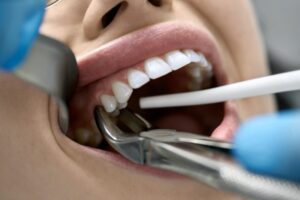
Tooth extraction might sound like a last resort, but in many cases, it’s the best decision for your overall oral health. While dentists always aim to preserve your natural teeth, there are times when removing a problematic tooth is necessary and beneficial. Here’s a closer look at 5 ways a tooth extraction can actually improve your dental health and quality of life.
1. Relieves Pain and Infection
One of the most common reasons for tooth extraction is to relieve intense dental pain caused by decay or infection. When a tooth is severely damaged or decayed beyond repair, bacteria can reach the inner pulp, leading to inflammation, infection, and throbbing discomfort. If a root canal isn’t a viable solution, extracting the tooth can eliminate the source of pain and prevent the infection from spreading to surrounding areas or even into the bloodstream.
2. Prevents Crowding and Misalignment
In some cases, especially with children or teenagers, teeth may be extracted to prevent overcrowding. This is particularly common in preparation for orthodontic treatment like braces. Removing one or more teeth can create the space needed to align the remaining teeth properly, reducing the risk of bite issues and improving the long-term function and aesthetics of the smile.
Wisdom teeth, which often erupt in early adulthood, are also frequently extracted for this reason. When these third molars don’t have enough room to grow in properly, they can push against neighboring teeth and cause misalignment or impaction.
3. Protects Adjacent Teeth
A severely damaged or infected tooth can pose a threat to the health of neighboring teeth. If decay or infection spreads, it may compromise surrounding teeth and gums, leading to more extensive and costly dental problems. Removing the compromised tooth eliminates this risk and helps maintain the health of the rest of your mouth.
4. Improves Oral Health in Advanced Gum Disease
In cases of advanced periodontal (gum) disease, the tissues and bone that support your teeth can deteriorate. This can cause teeth to loosen and shift. If a tooth is no longer stable due to severe bone loss, extraction may be necessary to prevent further damage and to allow for treatments like dentures or implants that can restore function.
5. Makes Way for Effective Restorative Solutions
Sometimes, removing a problematic tooth opens the door for better long-term dental solutions. A damaged tooth may be extracted to make way for a dental implant, bridge, or denture that provides a more functional and aesthetically pleasing replacement. These options can restore your bite, speech, and confidence.
While losing a natural tooth might feel daunting, extraction can offer real relief and significant long-term benefits. Whether it’s eliminating pain, preventing future dental issues, or preparing for orthodontic or restorative treatment, tooth extraction is often a strategic step toward better oral health. If your dentist recommends an extraction, know that it’s a carefully considered move designed to protect your smile, not take away from it.
About the Author
Dr. Tommy Murph has served the Conway community for more than 25 years. He is a graduate of the Medical University of South Carolina and has completed more than 600 hours of continuing education courses. Dr. Murph also stays current through his memberships in the American Dental Association and the South Carolina Dental Association. If you’re in need of tooth extraction, trust Dr. Murph and our talented team of professionals to take care of you. Schedule an appointment online or call us at (843) 488-4357.
